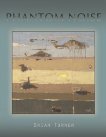Brian Turner: Phantom Noise
Few poets in America have had as much pressure going into their second book as Brian Turner, whose collection Phantom Noise was recently published with Alice James Books. The pressure is the result of a first collection Here, Bullet that garnered significant commercial (for poetry standards at least) and critical success, and now stands as an important text not just in the poetry world, but in the broadening canon of literature on the topic of the Iraqi war.
In Here, Bullet, the poems' speakers identified as soldiers, as many, if not all of the poems, allude to specific locations within Iraq, and the immediacy of violence and pain inherent in those places and experiences. While Phantom Noise still emphasizes images and anecdotes from the war in Iraq and Afghanistan, the landscape broadens, incorporating landscapes of Western origin. Even the titles confirm Turner's shift in focus – "VA Confessional Hospital", "Aubade: Layover in Amsterdam", and "To My Unnamed Daughter", among others. However, the poems often move fluidly in landscape, shifting from the Iraq war to America from stanza to stanza (as in "On the Flight to Alamoso, Colorado") or even line to line in many poems, including the strong opener, "At Lowe's Home Improvement Center", which examines the effects and chaos of Post-Traumatic-Stress-Disorder (PTSD) through the imagined battlefields in the numbered aisles at Lowe's. The fourth section of the poem, for example, begins at the cash register, but quickly enters the mind of a person with PTSD.
Cash registers open and slide shut
with a sound of machine guns being charged.
Dead soldiers are laid out at the registers,
on the black conveyor belts,
and people in line still reach
for their wallets.
[Turner p. 6]
With the cross-cultural images, landscapes, and narratives involving PTSD throughout Phantom Noise it would be an easy, if not a natural segue into a more politically charged text, yet Turner, to his credit, avoids those simplistic tropes (I'm thinking most directly about unintelligent jabs at former President George W. Bush), and instead offers empathetic speakers whose breadth of knowledge in history and Arabic language (as many of the poem's include epigraphs, dialogue, and idioms in Arabic) establish authority, and more importantly, allow for varying ways for readers to enter into the poem. In one of, if not the book's strongest poem, "Al-a'imma Bridge", Turner scans the history of war by recalling the tragedy at the Al-a'imma Bridge where nearly a 1000 people were trampled in late 2005) after the rumor of a suicide bomber on the bridge caused widespread panic (as detailed in the endnotes. In just the seventh stanza of the four and half page poem, Turner expands the original narrative and landscape, incorporating the "German Luftwaffe", the "Six-Day War", and "the one million who died fighting Iran." The poem continues with the collective idea of falling, until Gilgamesh propels the poem toward its end.
Gilgamesh can do nothing, knows that each life is the world
dying anew, each body the deep pull of currents below, lost,
and lost within each—the subtle, the sublime, the horrific,
the mundane, the tragic, the humorous and the erotic— lost …
[Turner, p. 30]
As is seen in "Al-a'imma Bridge", much of Turner's writing hinges on lyricism, but the poems in "Phantom Noise" have the most success when the speakers and the anecdotes are pitched at a less controlled frequency, as is seen in "Stopping The American Infantry Patrol Near The Prophet Yunus Mosque In Mosul, Abu Ali Shows Them The Cloth In His Pocket", "Ajal", "Zippo", and "White Phosphorus" to name a few. "Ajal", a persona poem from the voice of father to a son, offers the strongest example of a compelling, yet uneasy speaker.
There are ninety-nine special names for God,
my son, and not so long ago I held you
newly born under a crescent moon,
and gave you the name which means servant
of God, and I did not speak of tanks,
the thunder of iron, missiles flying
over the rooftops of our city—I whispered
the call to prayer once in each ear.
[Turner, p. 78]
When Phantom Noise is less successful it often reduces a narrative or a thought, distilling it to a single statement at the very end of a poem. This kind of movement is far less interesting – even frustrating, for that matter. The most glaring example is in ".22-Caliber", which recalls the speaker's father preparing and handling a gun with his son. The poem describes the scene and expands to the larger idea of "maturation" and "the death of naivete," but then takes a last, unnecessary step in the last three lines, "wrapping up" and summarizing the poem.
I am learning how to connect
with the small dark silence
carried within the center of all things.
[Turner, p. 53]
These lines are gratuitous and abstract, if not cliché and repetitive, as the poem's images and narrative already have achieved this aforementioned thought, and in a more interesting and skillful way.
While several poems in Phantom Noise contain the same flaw as ".22-Caliber", the book as a whole is enjoyable to read. It is, in some ways, a move away from the rawness of Here, Bullet and a move towards the contemplative mode. In terms of craft, Turner has a consistently strong lyrical voice, and ultimately that is what carries the reader through each poem. Phantom Noise is a strong collection, and one, like Here, Bullet that will be an important text not just about the Iraqi war, but about the less glamorous, and often more traumatic, life after soldiers come home, wherever home may be.
 Brian Turner
Brian Turner